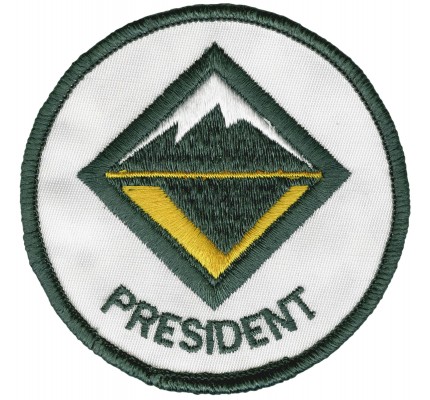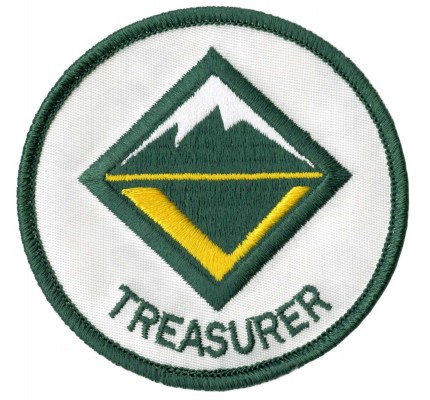Leadership Positions
The leadership roles of a Venturing Crew is set up largely similar to the Scouts BSA program with a few exceptions. Venture Crews do not have regular smaller sub groups like patrols or dens, however there can be Activity Chairs that, with a group of other Scouts are responsible for the planning of specific outings or activities. These groups are assembled based on interest and skill and are not continually fixed the way patrols tend to be. The other change from the Scouts BSA model, is that in Venturing the role of the Treasurer is moved to a youth position. This is in line with Venturers being older and the program pushing them to be progressively more independent.
Venturing Youth Leadership

The President is the highest youth position in the Crew. They are ultimately responsible for the decisions and operations of the Crew for their term of service. However, like any good leader they will listen and make good use of the other Venture Scouts and youth leaders to make purposeful high quality decisions for the good of the entire Crew.

The Vice President’s job is to assist the President and support their needs for effective operation of the Crew. These two positions should work well together to support each other. The Vice President is also in charge of the Crew when the President is not able to attend an event. In some larger Crews they choose to have two Vice Presidents. One oversees the administrative purposes including the work of the Secretary and Treasurer, who report to them. The other Vice President is over the program of the Crew such as activity and event planning. They would have any Activity Chairs and Crew Guides report to them.

The Secretary is the record keeper of the Crew, similar to the Scouts BSA Scribe. They keep track of attendance at events, and record meeting minutes for regular meetings as well as planning conferences or sessions. They are the organizer of paperwork and should be supplied with information from Activity Chairs so that there is a constant running record of activities.

The Treasurer, obviously with adult oversight, keeps all financial records for the Crew and creates a budget for their term of service. They should be consulted when making purchases to make sure that funds are available and that the purchase is in the best interest of the long term planning for the Crew. They should also be the point person for fundraising activities.

The Crew’s Quartermaster is responsible for all of the Crew’s gear. A good Quartermaster should keep track of inventory, and meet with the previous Quartermaster when taking over to go over the inventory together. They should also do periodic checks of all gear to make sure that it is in working order. If an activity being planned requires equipment the Quartermaster should be consulted so that they can confirm that the needed supplies are available or determine that they need to be purchased. They should also be consulted when new purchases are required so that they are aware of inventory and may have suggestions of items that could serve multiple purposes.

A Crew Guide is a veteran of the Crew that can help a new Venturer or group of Venturers settle into the Crew. Whether the new members are experienced Scouts that just need help adjusting to the changes from a Troop to a Crew, or are completely new to Scouting and may need assistance understanding how the whole program works. Crew Guides can also be great resources to help teach newer members to the Crew skills that are required for rank advancement.

While certainly not a “needed” position, a Crew Historian can be a great way to document the history of the group. This could be done through written records, physical scrapbooks, or use of a Crew website or social media. Having a known history for the Crew can be helpful for repeating successful events that have not been done in a while, or just to be able to keep track of all the things the Crew has done over decades.
Adult Leadership Positions

The Crew Advisor is the lead adult in overseeing the regular operations of the Crew. This position is on par with a Cubmaster or Scoutmaster. Since this is an older Scout program the Advisor should be mostly a background player unless needed for a health or safety issue. Let your Scouts work themselves into a corner and get back out of it before you jump in to fix it. When approached for advice ask the Venturers questions that will lead them to the answers rather than just telling them what to do. Again, if there is a significant safety threat the Advisor should insert themselves, but outside of those situations allow the Venturers a safe place to fail and then let the problem solve their way out of the issue on their own whenever possible.

The Associate Advisor is the back up for the Advisor. Depending on the size and structure of the Crew they can be utilized as just another adult to make sure things are safe and running smoothly or, as in the case of the Vice President, a Crew can have multiple Associate Advisors that cover administrative or program needs. This is entirely up to each Crew and the needs of the unit.

As with the other programs in the Boy Scouts of America the Committee Chair has the final say in Crew matters. It is their job to approve adult leader registrations and be a point of contact for anyone who has an issue with the way the Crew Advisor is running things.

Each Crew should have a Committee that serves as guides for the Crew. Having a Committee made up of a diverse group of backgrounds and skill sets can be helpful to provide resources and support to the Crew including serving as direct resources to Activity Chairs who may need specific expertise in planning an event.

As with all programs in the Boy Scouts of America, each unit must have a Chartered Organization Representative (COR). This person acts as a liaison between the Crew and the Chartered Organization that is sponsoring them. Ideally this person works directly with, and is a part of the Chartered Organization. Examples of this might be; an officer in the VFW, Deacon in the Church, or other similar position within the Chartering Organization. At times though the COR is just someone who keeps up ties with the charter to keep them abreast of what is happening with the unit and a go between when either of the partners has a question or a concern for the other.